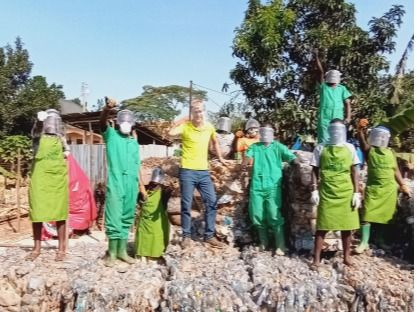Approved by curator

Added: Feb 16, 2021
Last edited: Sep 29, 2022
Eco Brixs is a closed-loop recycling system providing employment and creating a positive environmental impact in Masaka, Uganda
About 600 tonnes of plastics are generated in Uganda every day. Some 90% of this is sent to landfill or burnt illegally, as there is no formal means of waste collection. A small proportion is collected, pelletised and shipped to markets such as China and India to be used as raw materials. However, this unmanaged plastic waste is a tremendous opportunity. It can be recycled to make construction materials with a smaller environmental footprint, and in the process create jobs to help tackle Uganda’s high unemployment rate.
Eco Brixs started in 2017 as the Masaka Recycling Initiative, at which point it focused on plastic recovery. After two years of operation, Andy realised more could be done to capture the value in plastics as well as support the local economy, and Eco Brixs was born. In collaboration with universities and other experts they have researched how to transform the plastic. Now, they recycle seven types of plastics to make various products, such as an innovative plastic-sand composite paver, which has proven to be stronger, lighter and more durable than concrete. A series of other prototypes are in the pipeline. Eco Brixs’ other focus is on creating jobs – especially for people with disabilities – supporting the local economy and educating people on plastic waste. They have set up 20 recycling centres in different communities across Uganda. They also collaborate with schools to educate students on good environmental practices, establishing 31 ‘Eco Clubs’ with over 900 students. More recently, to support COVID-19 efforts, Eco Brixs have produced PPE from recycled plastics.
This case study has been created as part of Footprints Africa's work to build the first ever comprehensive mapping of circular economy initiatives in Africa. This will lay the foundation open-source database that can inspire local initiatives, as well as inform the global dialogue, which is largely focused on the European and American contexts. We are doing this in collaboration with the African Circular Economy Network (ACEN). ACEN's vision is to build a restorative African economy that generates well-being and prosperity inclusive of all its people through new forms of economic production and consumption which maintain and regenerate its environmental resources.
The objective is to build an open-source database featuring 500 cases by the end of 2021, with strong regional representation. These will feature in the Knowledge Hub and are also being mapped by GRID-Arendal.




Stretch the lifetime
Use waste as a resource
Maximise lifetime of products after use
Design for durability
Africa
Circular Economy
Footprints Africa
construction and infrastructure
uganda
masaka
plastics
PPE
jobs
